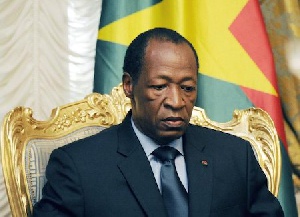Blaise Compaore, the president of Burkina Faso, has been forced to leave power after days of protests by tens of thousands of people calling for his ousting.
He announced his resignation in a statement on Friday and called for a 90-day transition to "free and transparent" elections in the West African country.
"I declare a vacancy of power with a view to allowing a transition that should finish with free and transparent elections in a maximum period of 90 days," said the statement, read on local radio and television by presenters.
It was unclear who was in charge of the country following his resignation.
"As of today, Compaore is no longer in power," Army Colonel Boureima Farta earlier told tens of thousands of protesters who had gathered in front of the army headquarters.
Arsene Evariste Kabore, the former editor-in-chief of RTB Television in Ouagadougou, told Al Jazeera that Compaore had left the capital on Friday, travelling towards the southern town of Po, near the border with Ghana.
Compaore had been in power since a 1987 coup against then-President Thomas Sankara, Compaore's longtime friend and political ally, who was shot dead.
Ouagadougou riots
Protesters stormed the parliament building in Ougadougou on Thursday and set part of it ablaze in a day of violence around the country aimed at stopping a parliamentary vote that would have allowed the president to seek a fifth term in office.
In a concession to the protesters, the government withdrew the bill from consideration.
But the move did not calm protesters, and General Honore Traore, the army's joint chief of staff, later announced that the government and parliament had been dissolved and a new, inclusive government would be named.
At least one person was killed and several others wounded during the unrest, authorities said, and a curfew was put in place from 7pm to 6am.
Imad Mesdoua, a political analyst speaking to Al Jazeera from London on Friday, said details about the possible transition of power were scarce.
He said the opposition was demanding civilian rule, but the army was expected to take on a central role in the country's Mesdoua future.
"There are reports of looting and unrest in other parts of the country, outside of Ouagadougou. The army will continue to play a strong role," he said.
The EU called on Friday for the people of Burkina Faso to have the final say in who rules their country.
"The European Union believes that it is up to the people of Burkina Faso to decide their own future. Any solution must be the result of a broad consensus and respect the constitution," a spokesman for the bloc's diplomatic service said.
General News of Friday, 31 October 2014
Source: www.aljazeera.com
Burkina Faso president resigns after protests
Entertainment
















